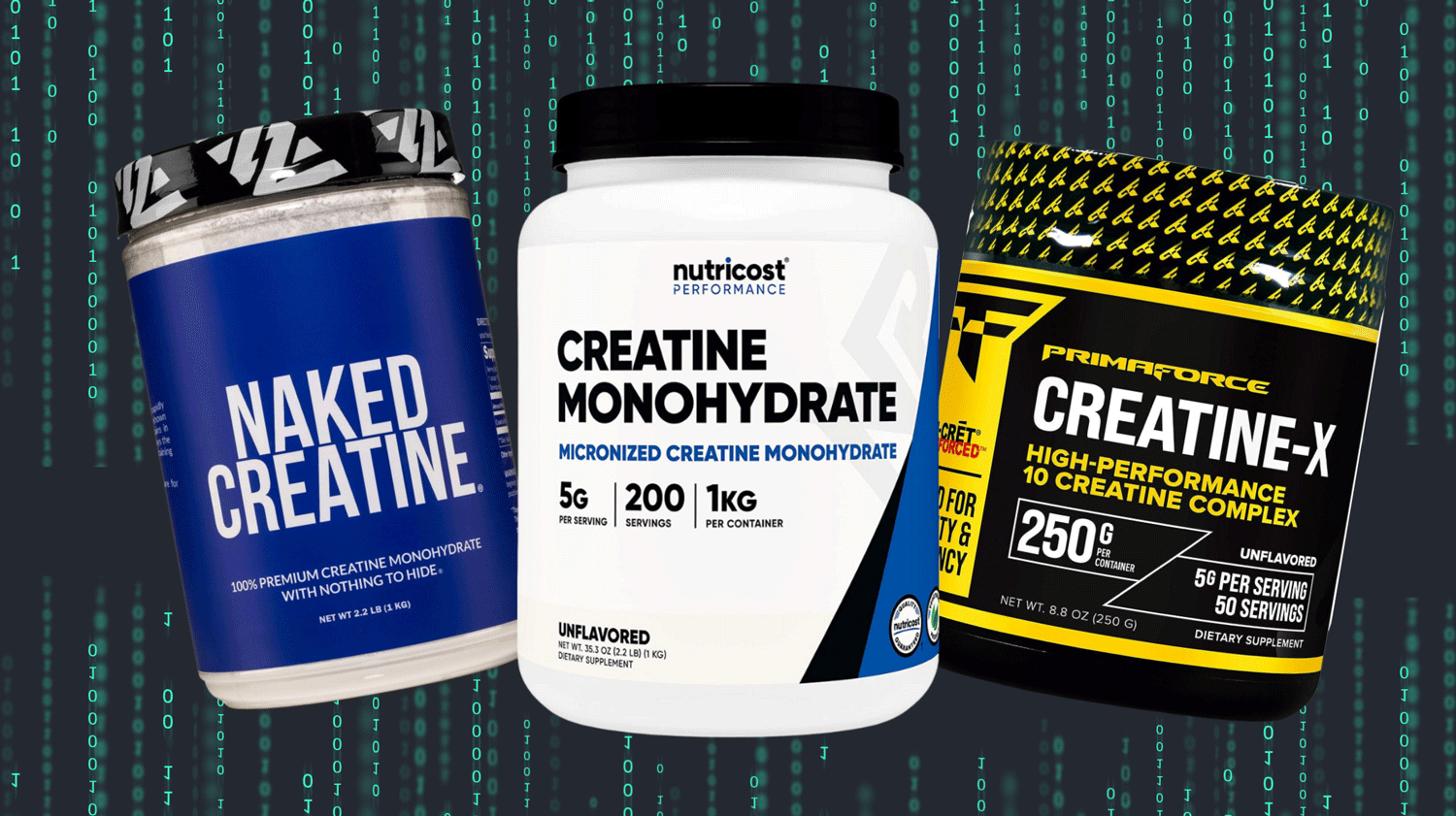What Are the Best Supplements to Take Before and After Your Workout?


Exercise places significant demands on the body, requiring a delicate balance of nutrients to fuel performance and support recovery. Proper nutrition plays a crucial role in optimizing workout results, enhancing endurance, strength, and overall athletic performance.
The food and supplements we consume provide the necessary building blocks for muscle repair, energy production, and adaptation to training stress. Understanding the interplay between nutrition and exercise is fundamental to achieving fitness goals, whether you’re an elite athlete or a casual gym-goer.
The role of supplements in supporting workout goals
While a well-balanced diet should form the foundation of any fitness regimen, supplements can play a valuable role in filling nutritional gaps and enhancing performance.


WHAT IS OUR #1 CREATINE SUPPLEMENT?
Check Our Ranking of the 12 Best Creatine Supplements for 2024
Supplements are designed to complement, not replace, a healthy diet. They can provide concentrated doses of specific nutrients that may be challenging to obtain solely from food, especially for those with intense training schedules or specific dietary restrictions.
When used appropriately, supplements can aid in improving energy levels, increasing strength, enhancing recovery, and supporting overall health and wellness in the context of a regular exercise routine.
Brief overview of pre- and post-workout supplementation
Pre-workout and post-workout supplementation strategies are designed to optimize different phases of the exercise process. Pre-workout supplements typically aim to enhance energy, focus, and performance during the workout itself.
They often contain ingredients like caffeine, amino acids, and nitric oxide boosters to improve blood flow and muscle function. Post-workout supplements, on the other hand, focus on recovery and muscle protein synthesis. These often include protein sources, carbohydrates for glycogen replenishment, and various compounds to reduce inflammation and oxidative stress.
Understanding the timing and composition of these supplements can help maximize their benefits and contribute to improved overall workout results.
Pre-Workout Supplements
Pre-workout supplements have become increasingly popular among fitness enthusiasts, promising enhanced performance, increased energy, and improved focus during exercise. In this chapter, we’ll explore the science behind two key pre-workout supplements: pre-workout blends and caffeine.
As a neuroscientist, I’m particularly interested in how these compounds interact with our brain and body to potentially boost workout capacity. We’ll examine their mechanisms of action, potential benefits, and important considerations for use.
While many users report positive effects, it’s crucial to understand that individual responses can vary significantly. As we delve into this topic, remember that supplements should complement, not replace, the fundamentals of proper nutrition, adequate sleep, and consistent training.
`Our goal is to equip you with evidence-based knowledge to make informed decisions about incorporating pre-workout supplements into your fitness regimen.


Pre-Workout Blends
Pre-workout blends are popular supplements designed to enhance exercise performance, increase energy, and improve focus. These products typically contain a mix of ingredients such as caffeine, amino acids, creatine, and various herbs or extracts.
While many users report improved workout intensity and endurance, it’s important to note that the efficacy of these blends can vary widely between individuals. Some people may experience significant benefits, while others might be more sensitive to stimulants or experience unwanted side effects.
When choosing a pre-workout blend, it’s crucial to look for products with transparent labeling that clearly state the amounts of each ingredient. Be wary of proprietary blends that don’t disclose specific quantities.
It’s also wise to start with a smaller dose to assess your tolerance, as some pre-workouts can be quite potent. Pay attention to the caffeine content, as excessive amounts can lead to jitters, anxiety, or sleep disturbances if taken too late in the day.
Caffeine
Caffeine is one of the most widely used and researched ergogenic aids. It has been shown to improve various aspects of exercise performance, including endurance, strength, power, and cognitive function.
Caffeine works by blocking adenosine receptors in the brain, reducing perceived exertion and fatigue. It also stimulates the release of adrenaline, which can enhance fat mobilization and increase alertness.
The optimal dosage of caffeine for performance benefits typically ranges from 3-6 mg per kilogram of body weight, taken about 30-60 minutes before exercise. However, individual responses to caffeine can vary greatly, and some people may be more sensitive to its effects.
It’s generally recommended to start with a lower dose and gradually increase as needed. Be mindful of your total daily caffeine intake from all sources, including coffee, tea, and energy drinks.
Creatine
Creatine is one of the most extensively studied and effective supplements for enhancing exercise performance and muscle growth. It works by increasing the availability of creatine phosphate in muscle cells, which helps to rapidly regenerate ATP during high-intensity, short-duration activities.
This can lead to improvements in strength, power output, and muscle mass gains when combined with resistance training.
The most common and well-researched form is creatine monohydrate. While some advocates recommend a loading phase of 20g per day for 5-7 days, followed by a maintenance dose of 3-5g daily, research has shown that simply taking 3-5g daily is effective for most people.
Creatine is generally safe for long-term use, but as with any supplement, it’s wise to cycle off periodically to assess your body’s response.
Beta-Alanine
Beta-alanine is an amino acid that, when ingested, combines with histidine in the body to form carnosine. Increased muscle carnosine levels can help buffer hydrogen ions, potentially delaying fatigue during high-intensity exercise lasting 1-4 minutes.
This makes it particularly beneficial for activities like high-intensity interval training or certain sports performances.
The typical dosage for beta-alanine is 3-6g per day, which can be taken at any time. It’s worth noting that beta-alanine supplementation often causes a harmless tingling sensation known as paresthesia.
This effect can be minimized by taking smaller doses throughout the day or using time-released formulations. Consistent supplementation over several weeks is necessary to see the full benefits of beta-alanine.
Citrulline Malate
Citrulline malate is a compound composed of the amino acid citrulline bound with malic acid. It has gained popularity as a pre-workout supplement due to its potential to enhance nitric oxide production, improve blood flow, and reduce fatigue during exercise. Citrulline is converted to arginine in the body, which then serves as a precursor for nitric oxide.
Research suggests that citrulline malate may improve exercise performance, particularly in activities involving multiple sets or repetitions.
The recommended dosage is typically 6-8g taken about 60 minutes before exercise. Some studies have used doses up to 10g, but higher doses may increase the likelihood of gastrointestinal discomfort in some individuals.
Branched-Chain Amino Acids (BCAAs)
Branched-chain amino acids, consisting of leucine, isoleucine, and valine, are essential amino acids that play a crucial role in muscle protein synthesis and energy production during exercise.
While BCAAs are often marketed as a pre-workout supplement, their efficacy in this context is somewhat controversial. Some studies suggest that BCAA supplementation before exercise may reduce muscle soreness and fatigue, particularly during prolonged endurance activities.
However, it’s important to note that if you’re consuming adequate protein in your diet, especially from animal sources, you may already be getting sufficient BCAAs. For those who might benefit from BCAA supplementation, a typical dose is 5-10g taken before or during exercise.
The most important BCAA is leucine, and products with a higher leucine content (often in a 2:1:1 or 3:1:1 ratio with isoleucine and valine) may be more effective for stimulating muscle protein synthesis.


Post-Workout Supplements
Post-workout nutrition plays a critical role in recovery, muscle growth, and overall athletic performance. The period immediately following exercise presents a unique opportunity to support the body’s adaptive processes through strategic supplementation.
From rapidly absorbed whey protein to slower-digesting casein, and from glycogen-replenishing carbohydrates to electrolytes for hydration, each of the following supplements offer distinct benefits for the post-exercise recovery window. Understanding the functions and optimal use of these supplements can help you tailor your post-workout nutrition strategy to maximize your training results and support your long-term fitness goals.
Whey Protein
Whey protein is one of the most popular and effective post-workout supplements. It’s rapidly absorbed by the body, making it ideal for quick delivery of amino acids to fatigued muscles. Whey protein has a complete amino acid profile, including high levels of leucine, which is crucial for stimulating muscle protein synthesis.
For optimal results, consume 20-30 grams of whey protein within 30 minutes to 2 hours after your workout. This timing can help maximize muscle recovery and growth, especially when combined with resistance training.
Casein Protein
While whey protein is fast-acting, casein protein offers a slower, more sustained release of amino acids. This makes it an excellent complement to whey protein or a good option on its own, especially before bed or when you have a longer period before your next meal. Casein forms a gel in the stomach, which slows digestion and provides a steady stream of amino acids to your muscles for several hours.
This can be particularly beneficial for maintaining an anabolic state during overnight fasting periods. Consider consuming 20-40 grams of casein protein before bed or as part of your post-workout recovery strategy if you won’t be eating a full meal for several hours.
Carbohydrate Supplements
Carbohydrate supplements play a crucial role in post-workout recovery, particularly for endurance athletes or those engaging in high-intensity, glycogen-depleting workouts. Consuming carbohydrates after exercise helps replenish glycogen stores, which can enhance recovery and prepare you for your next training session.
The amount and timing of carbohydrate intake depend on the intensity and duration of your workout, as well as your overall nutritional goals. A general guideline is to consume 0.5-0.7 grams of carbohydrates per kilogram of body weight within 30 minutes after exercise, and again every 2 hours for 4-6 hours to optimize glycogen resynthesis.
Electrolytes
Proper hydration is critical for recovery, and electrolyte supplements can play a key role in this process. During intense exercise, you lose electrolytes through sweat, which can impact fluid balance, muscle function, and overall performance. Key electrolytes to consider include sodium, potassium, magnesium, and calcium.
The amount needed varies based on factors such as workout intensity, duration, and individual sweat rates. Consider using an electrolyte supplement or consuming electrolyte-rich foods post-workout, especially after long or intense training sessions in hot environments.
L-Glutamine
L-Glutamine is the most abundant amino acid in the body and plays various roles in recovery and immune function. Intense exercise can deplete glutamine levels, potentially impacting recovery and immune health. Supplementing with L-glutamine post-workout may help support muscle recovery, reduce muscle soreness, and maintain immune function, especially during periods of intense training.
While more research is needed to fully understand its benefits, many athletes find it helpful. A typical dosage ranges from 5-10 grams post-workout, with some individuals taking up to 20-30 grams per day divided into several doses.
Pre-Workouts
Interestingly, some athletes and fitness enthusiasts have begun experimenting with taking pre-workout supplements post-exercise. The idea is that certain ingredients in pre-workouts, such as citrulline malate, beta-alanine, and creatine, may aid in recovery and prepare the body for the next training session.
This approach might help improve blood flow, reduce muscle soreness, and enhance nutrient delivery to recovering muscles. However, it’s important to consider the stimulant content of many pre-workouts, as consuming caffeine or other stimulants too close to bedtime can interfere with sleep.
If you choose to try this approach, consider using a stimulant-free pre-workout or adjusting the dosage. As with any supplement strategy, it’s crucial to monitor your body’s response and adjust accordingly.


Combination Strategies
When it comes to optimizing workout performance and recovery, the strategic combination of supplements can offer synergistic benefits that exceed the sum of their individual parts.
This approach, often referred to as “stacking,” allows athletes and fitness enthusiasts to tailor their supplementation to specific workout goals, exercise types, and individual physiological needs. In this section, we’ll explore how different supplements can be combined for pre-workout energy and focus, post-workout recovery, and various exercise modalities.
Pre-workout supplement stacks
When it comes to pre-workout supplementation, combining certain compounds can potentially enhance their individual effects. A common and effective pre-workout stack might include caffeine for its performance-boosting and focus-enhancing properties, creatine for improved power output and muscle growth, and citrulline malate for enhanced blood flow and reduced fatigue.
Beta-alanine is often added to this stack for its ability to improve muscular endurance, particularly in high-intensity activities lasting 1-4 minutes. It’s important to note that while these combinations can be effective, they should be introduced gradually to assess individual tolerance and response.
Post-workout recovery blends
Post-workout recovery can be optimized by combining several key supplements. A typical post-workout blend might include fast-absorbing whey protein to kickstart muscle protein synthesis, combined with a simple carbohydrate source to replenish glycogen stores. Adding L-glutamine to this mix may support recovery and immune function, particularly during periods of intense training.
Some individuals also benefit from including casein protein in their post-workout blend, especially if the next meal is several hours away, as it provides a slower, more sustained release of amino acids. Electrolytes are another crucial component to consider in a post-workout blend, particularly after sweaty or prolonged sessions, to support proper hydration and cellular function.
Considerations for different types of exercise
The optimal combination of supplements can vary significantly depending on the type of exercise being performed. For endurance activities, such as long-distance running or cycling, a pre-workout stack might emphasize caffeine and beta-alanine, with less focus on creatine.
The post-workout strategy for endurance athletes often prioritizes rapid carbohydrate replenishment along with protein. For strength training or high-intensity interval workouts, creatine becomes a more central component of the pre-workout stack, while the post-workout emphasis might shift towards a higher protein content.
Combat sports or other activities with weight classes might require more careful consideration of the caloric content in supplement combinations. It’s crucial to tailor supplement combinations not just to the type of exercise, but also to the specific goals of the training phase, be it performance, muscle gain, fat loss, or general health.




